Note-Taking

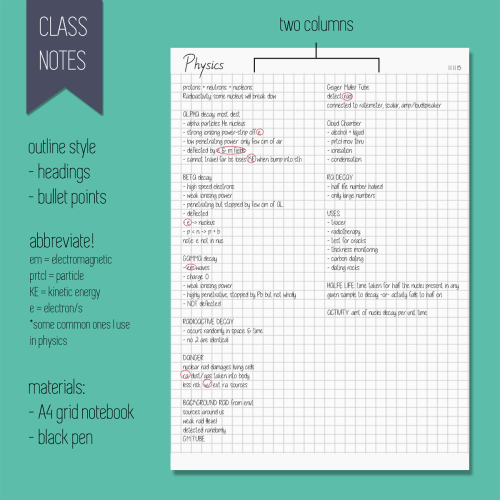
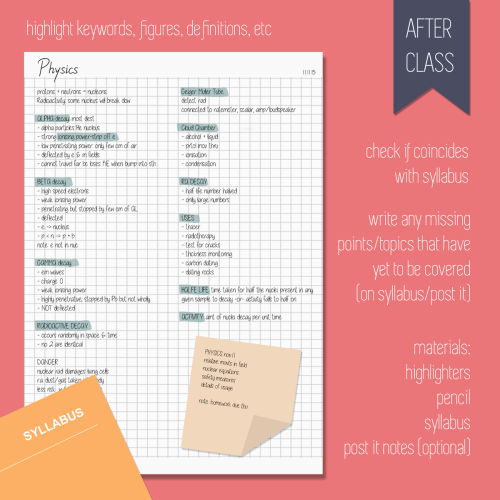
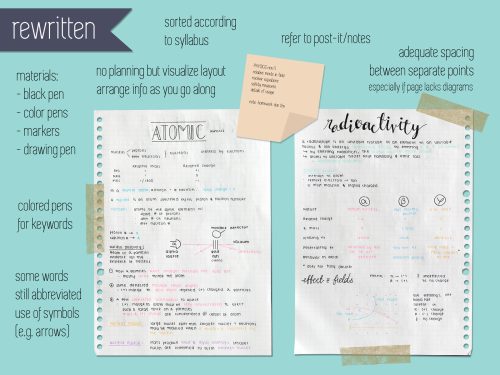
Note-Taking
Hey guys! So I’ve been receiving questions regarding my note-taking style and strategy for quite some time now but I believe I have never answered them in detail. The good news is, I finally decided to make a post about this (plus, I had fun making the graphics :D). Note that I am a visual learner, so my note-taking methods may not be effective for some of you, but I hope you can all learn something.
Class Notes
I only use one notebook for all my class notes, an A4 grid notebook whose pages I divide into two columns.
I use the outline method for in-class notes, which means I write information chronologically, in the order that they are taught. Some teachers do not have properly structured presentations/lessons (good thing my physics teacher does) so when in need, I use arrows to connect related information.
Abbreviations to me are one of the most important things to master when taking notes. I personally make them up as I go along. Some examples of abbreviations I use are:
w/c - which
w/ - with
cpd - compound
envt - environment
digenz - digestive enzyme
It might be confusing, but to me, knowing the context and part of speech are enough for all abbreviations to be comprehended.
Here’s an example: ‘Indonesia’s tsunami pre-warning system is made up of two types of components’ could become ‘Indo’s snmi pre-warn sys 2 type comp’.
After Class
The first thing I would do is highlight keywords and terminology (and sometimes formulas). For physics, since my teacher is relatively succinct, I don’t really highlight, but for humanities and biology, I look for words that would be expected by a mark scheme, words that are crucial to the understanding of each particular piece of information.
I would then check if the material taught coincides with the syllabus, and if not, note down any points that are missing or have yet to be taught. You could write these on a post it or on the syllabus itself, but I prefer to highlight the syllabus’ pdf file.
Rewritten Notes
My rewritten notes are arranged based on the order they appear in the syllabus unless there are pieces of information that are related to more than one topic.
I use a black pen for rewriting notes as well as colored pens to write keywords and terminology only. I know some people who write whole sentences in colored pens but to me that is ineffective; we all have our own learning styles. When making tables, I usually use different colors for different columns (see the table for different types of radiation above) which is most often the color I associate with each word. For example, water would be blue, ocean would be a darker shade, ice would be a lighter shade, and water vapor would be purple.
I still abbreviate words in my rewritten notes, but they’re not as condensed as the ones in my class notes. Another thing I find helpful is leaving a bit of space between separate points especially if the page doesn’t have a lot of diagrams. I can’t think linearly, so I can’t remember super lengthy bullet points.
I use mildliners and a drawing pen to make my diagrams (more of these in my biology notes) but I only start with pencil if it’s a complex diagram. I rarely highlight my rewritten notes, but even if I do, it’s usually only the headings and formulas.
I don’t have a rough draft for my notes, but I try to visualize the layout. I try to alternate between words and pictures/diagrams so that when I’m sitting for an exam, all I have to do is imagine that I’m looking at that page and I can remember where everything is.
Well, that’s all from me. I hope that this information could be of some use to every single one of you. Don’t hesitate to ask me questions if you’re confused about note-taking or any other problems you might have :)
More Posts from Swirlspill-study and Others
DEAR RESEARCHERS OF TUMBLR
You know what’s awesome? Research. You know what’s not awesome? Not being able to get access to research because it’s stuck behind a paywall and you don’t belong to an institution/your institution doesn’t subscribe to that particular journal.
FEAR NOT.
Here is a list of free, open access materials on a variety of subjects. Feel free to add if you like!
GO FORTH AND LEARN SHIT, MY FRIENDS.
Directory of Open Access Journals- A compendium of over 9000 journals from 133 countries, multilingual and multidisciplinary.
Directory of Open Access Books- Like the above, but for ebooks. Also multidisciplinary.
Ubiquity Press- Journals covering archaeology, comics scholarship, museum studies, psychology, history, international development, and more. Also publishes open access ebooks on a wide variety of subjects.
Europeana- Digital library about the history and culture of Europe.
Digital Public Library of America- American history, culture, economics, SO MUCH AMERICA.
Internet Archive- In addition to books, they have music and videos, too. Free! And legal! They also have the Wayback Machine, which lets you see webpages as they looked at a particular time.
College and Research Libraries- Library science and information studies. Because that’s what I do.
Library of Congress Digital Collections- American history and culture, historic newspapers, sound recordings, photographs, and a ton of other neat stuff.
LSE Digital Library- London history, women’s history.
Wiley Open Access- Science things! Neurology, medicine, chemistry, ecology, engineering, food science, biology, psychology, veterinary medicine.
SpringerOpen- Mainly STEM journals, looooong list.
Elsevier Open Access- Elsevier’s kind of the devil but you might as well take advantage of this. Mainly STEM, also a linguistics journal and a medical journal in Spanish.
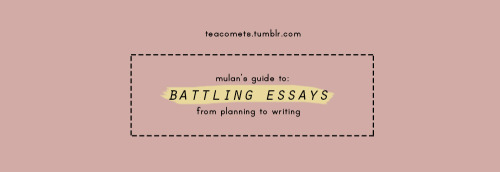
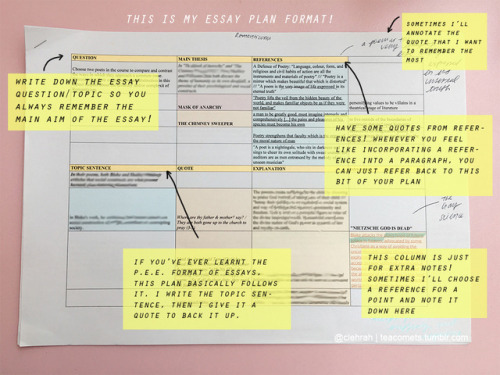
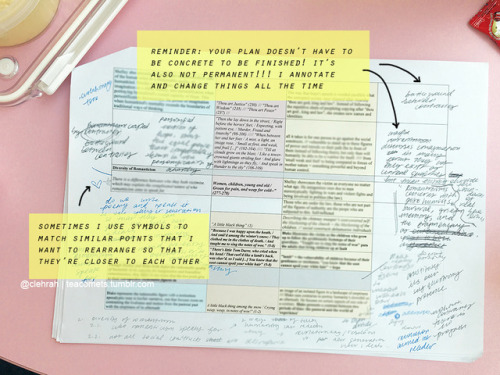
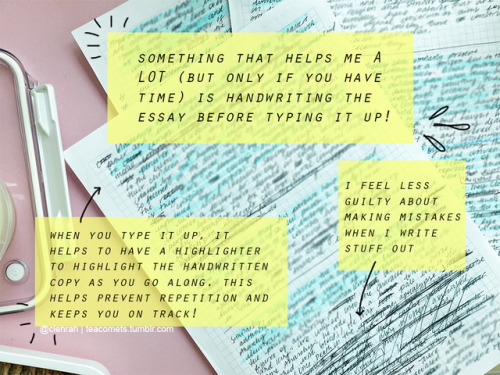
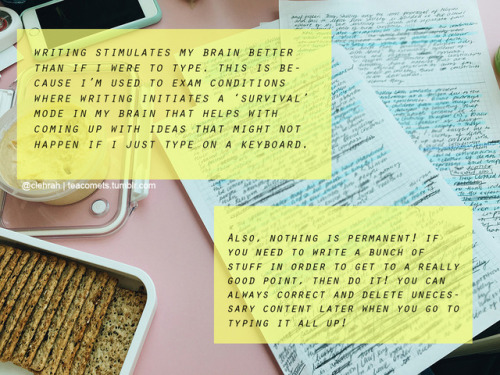

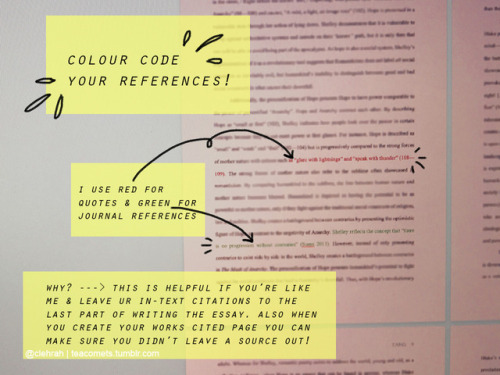
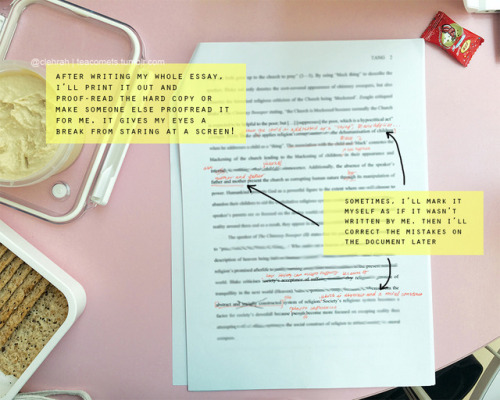

a small guide on how i battle my essays! (click on an image to view it clearer)
(keep in mind: i’m an english major so a majority of my essays are literature-focused!)
these are just some of the methods i want to share that work for me when i write my innumerable amount of essays! i’m definitely a huge planner so it’s no secret that i spend a lot of time on an essay. if you’re a deadline fighter, these tips might not necessarily be helpful (especially the handwriting one). but i hope this gives you an insight on how i write my essays! 🌈

SYNESTHESIA // an instrumental mix to fill you up with wonder and paint your vision rich with color
i. a fuoco - ludovico einaudi | ii. arrival of the birds - the cinematic orchestra | iii. atonement - dario marianelli | iv. fragile n.4 - dustin o’halloran | v. mescaline - abel korzeniowski | vi. forrest gump suite - alan silvestri | vii. gymnopédie no.1 - erik satie | viii. sherlocked - david arnold & michael price | ix. tennessee - hans zimmer | x. main titles - rachel portman | xi. stars and butterflies - jean-yves thibaudet | xii. we move lightly - dustin o’halloran | xiii. the king’s speech - alexandre desplat | xiv. arabesque no.1 - claude debussy | xv. divenire - ludovico einaudi
{listen}
How to Really Comprehend a Scientific Paper
**credit to my research advisor, she’s an amazing mentor and I aspire to be just like her someday :)
Read the abstract. Write down what the paper says it is going to be about.
Read the introduction. Write down what the paper says it is looking to accomplish and how.
Read the conclusion. Write down what the paper actually did accomplish.
Go through and find all the pictures, graphs, or diagrams. Write notes explaining these images to yourself.
Read the whole paper start to finish. Write a summary of the paper as though you are explaining it to a layperson, and then another summary as though you are explaining it to a colleague.
Throughout all of the above steps:
If there are words you don’t know google them and write down the definitions
If the paper defines a formula, law, variable, etc in a certain way write that down
If there are references to or recommendations of other literature write those down. After the last step if there’s anything you’re uncertain about or would like more information on look to that list for further reading


Hot tea is refreshing to me the same way rain is. They both make me feel like I have a fresh start. I’m late again, but Day 11 of the April challenge by @journa
as i get farther along this academic road, i can see that people are becoming increasingly secretive about their grant proposals, statements for faculty applications, fellowships, etc. what is your policy on sharing these things? i ask because i think you are a Normal Human Being who is a Decent Person, and sometimes this secrecy or tendency to distrust makes me sad!
i understand and i really dislike it as well, but i think it’s important to remember that much of that distrust comes from real and historical patterns of intellectual theft (which hit disproportionately across academia). it’s shitty! the world is a better place when we can share openly and help each other get through the absolute absurdity of the academy! but i can’t think badly of anyone who chooses not to spread their materials around. even though they’re not the same kind of work as, say, a book chapter or an article, we put a lot of labor into documents like proposals and applications, and i think it’s okay to be protective of that labor.
that said, i’m really open with mine, particularly with people that i actually know. my roommate’s getting a big folder of fellowship and job application materials from me, for example, which is partially bc i love him & the other younger premodernists in my program and want them to succeed, and partially bc i want to save our shared advisor some work. my fellowship group have swapped and given feedback all our job materials, and juliana @caffeinebooks & i exchange proposals all the time. i’m happy to share things like cover letters and research statements with people that i know, because i want to save them some of the angst i went through (which was already ameliorated by the folks who did this for me). it’s harder to muster that kind of generosity towards people i don’t know, because, as selfish as it sounds, i spent 9 hours getting the wording on that cover letter right and i’m enough of an asshole to want to reserve the fruits of that labor for people i know and love, at least until i’ve moved on to other forms of labor. i was not planning on sharing my job materials until i got a job. now i’m cool with it.
i feel an obligation to pay forward a lot of the help that i’ve gotten on my materials from people who shared theirs with me. but i also understand not being comfortable doing that, or only being comfortable doing that in certain ways. the giving and the getting should be balanced, IMO, but i think it’s up to the individual to decide what that balance looks like for them.
Free Online Language Courses

Here is a masterpost of MOOCs (massive open online courses) that are available, archived, or starting soon. I think they will help those that like to learn with a teacher or with videos. You can always check the audit course or no certificate option so that you can learn for free.
American Sign Language
ASL University
Arabic
Arabic for Global Exchange (in the drop down menu)
Arabic Without Walls
Intro to Arabic
Madinah Arabic
Moroccan Arabic
Catalan Sign Language
Intro to Catalan Sign Language
Chinese
Beginner
Basic Chinese
Basic Chinese I. II, III, IV , V
Basic Mandarin Chinese I & II
Beginner’s Chinese
Chinese for Beginners
Chinese Characters
Chinese for HSK 1
First Year Chinese I & II
HSK Level 1
Mandarin Chinese I
Mandarin Chinese for Business
More Chinese for Beginners
Start Talking Mandarin Chinese
UT Gateway to Chinese
Chino Básico (Taught in Spanish)
Intermediate
Chinese Stories
Intermediate Business Chinese
Intermediate Chinese Grammar
Dutch
Introduction to Dutch
English
Online Courses here
Resources Here
Faroese
Faroese Course
Finnish
A Taste of Finnish
Basic Finnish
Finnish for Immigrants
Finnish for Medical Professionals
French
Beginner
AP French Language and Culture
Basic French Skills
Beginner’s French: Food & Drink
Diploma in French
Elementary French I & II
Français Interactif
French in Action
French for Beginners
French Language Studies I, II, III
French:Ouverture
Intermediate & Advanced
French: Le Quatorze Juillet
Passe Partout
La Cité des Sciences et de Industrie
Frisian
Introduction to Frisian (Taught in English)
Introduction to Frisian (Taught in Dutch)
German
Beginner
Beginner’s German: Food & Drink
Conversational German I, II, III, IV
Deutsch im Blick
Diploma in German
Rundblick-Beginner’s German
Advanced
German:Regionen Traditionen und Geschichte
Landschaftliche Vielfalt
Hebrew
Biblical Hebrew
Know the Hebrew Alphabet
Teach Me Hebrew
Hindi
A Door into Hindi
Business Hindi
Virtual Hindi
Icelandic
Icelandic 1-5
Indonesian
Learn Indonesian
Irish
Introduction to Irish
Italian
Beginner
Beginner’s Italian: Food & Drink
Beginner’s Italian I
Introduction to Italian
Italian for Beginners 1 , 2, 3 , 4 , 5, 6
Intermediate & Advaned
Intermediate Italian I
Advanced Italian I
La Commedia di Dante
Japanese
Genki
Japanese JOSHU
Japanese Pronunciation
Sing and Learn Japanese
Tufs JpLang
Kazakh
A1-B2 Kazakh (Taught in Russian)
Korean
Beginner
First Step Korean
How to Study Korean
Learn to Speak Korean
Pathway to Spoken Korean
Intermediate
Intermediate Korean
Nepali
Beginner’s Conversation and Grammar
Norwegian
Introduction to Norwegian
Norwegian on the Web
Portuguese
Curso de Português para Estrangeiros
Pluralidades em Português Brasileiro
Russian
Beginner
Easy Accelerated Learning for Russian
Advanced
Reading Master and Margarita
Russian as an Instrument of Communication
Siberia: Russian for Foreigners
Spanish
Beginner
AP Spanish Language & Culture
Basic Spanish for English Speakers
Beginner’s Spanish:Food & Drink
Fastbreak Spanish
Introduction to Spanish
Restaurants and Dining Out
Spanish for Beginners
Spanish for Beginners 1, 2, 3, 4, 5, 6
Spanish Vocabulary
Intermediate
Spanish:Ciudades con Historia
Spanish:Espacios Públicos
Advanced
Corrección, Estilo y Variaciones
Leer a Macondo
Spanish:Con Mis Propias Manos
Spanish: Perspectivas Porteñas
Swedish
Intro to Swedish
Swedish Made Easy 1, 2, & 3
Ukrainian
Read Ukrainian
Ukrainian Language for Beginners
Welsh
Beginner’s Welsh
Discovering Wales
Multiple Languages
Ancient Languages
More Language Learning Resources & Websites!
Last updated: March 1, 2017
What made you get into bioethics? Like, what about it captivated you enough to go to school for it?
As with all the great passions of my life–theology, every boy I’ve ever liked–it started with an argument.
The summer before my junior year of high school, I went to a summer camp where we stayed on a college campus and took mini “classes” and generally nerded it up for three weeks. You got to choose your “major”–the main class you took–but you were also assigned a random “minor”. The minors were unusual, like Hebrew or pottery or the history of war.
I was put in Bioethics.
My teacher was a professor of philosophy from a nearby university, and I fucking loved every second of it. I loved the articles we read, I loved watching Gattaca and talking about genetic manipulation and individuality, I loved the professor and the insights he brought up (one day class was totally derailed by the question of why we refer to the soul as “my/mine/ours” what’s doing the owning there? that blew my little high school mind.)
Most of all, I loved the arguing, I loved the wordy back and forth of it–I’d been reading Stoic philosophy in Latin and ethics is endemic to theology classes, so I had a vague grasp of the territory. The rest was being quick on your feet, taking in information and then twisting it, trying to articulate vast things, poking holes in someone’s argument and defending your own. Looking back, I am dead certain I was insufferable–there were whole classes that I spent just arguing with the professor, while my classmates looked on. But I was too excited by this new toy not to…be an asshole about it, basically.
The social dimension of science has always fascinated me–I can still remember our physics teacher sitting down and explaining the reason that Aristotelian physics hung around so long was because it bolstered Catholic theology, my AP Bio teacher talking about how Rosalind Franklin’s work was ignored. So when I was reading through UChicago’s course guide, and I saw their description of the major, I was sold.
And honestly, it was a perfect choice for me. “Bioethics” is a very simplistic way to put what I studied; the major itself was the history, philosophy, and social studies of science. So it was a chance for me to just glut myself on knowledge–one quarter I would hurry from my Cancer Biology class on the science quad to Magic & Medicine in Ancient Europe in the history building. I went to lectures about the social factors influencing kidney donation, and international medicine. I wrote my BA thesis on how bioethics has failed to respond to the changing way medicine is done.
There are things I regret about my undergrad career, but my major was absolutely not one of them.
-
 nerdhelp reblogged this · 1 month ago
nerdhelp reblogged this · 1 month ago -
 alucinideo liked this · 7 months ago
alucinideo liked this · 7 months ago -
 serialthrill liked this · 1 year ago
serialthrill liked this · 1 year ago -
 thisisgettingdifficult reblogged this · 1 year ago
thisisgettingdifficult reblogged this · 1 year ago -
 somepoetryshit liked this · 1 year ago
somepoetryshit liked this · 1 year ago -
 v1viluv liked this · 1 year ago
v1viluv liked this · 1 year ago -
 distlimifawkcha liked this · 1 year ago
distlimifawkcha liked this · 1 year ago -
 lavenderemo liked this · 1 year ago
lavenderemo liked this · 1 year ago -
 pocorugry liked this · 1 year ago
pocorugry liked this · 1 year ago -
 aac-autistic-studyblr reblogged this · 1 year ago
aac-autistic-studyblr reblogged this · 1 year ago -
 ladychandraofthemoone reblogged this · 1 year ago
ladychandraofthemoone reblogged this · 1 year ago -
 ladychandraofthemoone liked this · 1 year ago
ladychandraofthemoone liked this · 1 year ago -
 teanster123 reblogged this · 1 year ago
teanster123 reblogged this · 1 year ago -
 craftandstudy reblogged this · 1 year ago
craftandstudy reblogged this · 1 year ago -
 teanster123 liked this · 1 year ago
teanster123 liked this · 1 year ago
a study blog for collected references, advice, and inspiration
267 posts




